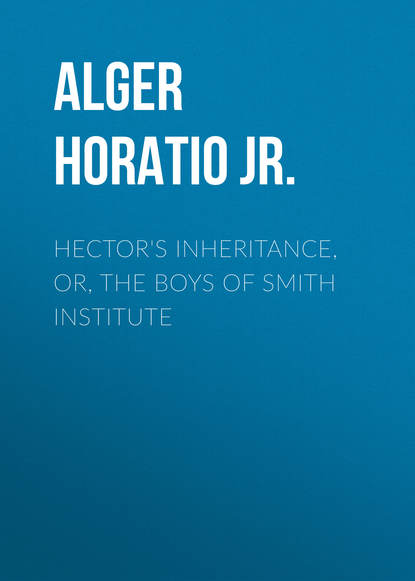По всем вопросам обращайтесь на: info@litportal.ru
(©) 2003-2024.
✖
Hector's Inheritance, Or, the Boys of Smith Institute
Настройки чтения
Размер шрифта
Высота строк
Поля
“I used to live there,” said Gregory—for it was he—with a sigh.
“Have you bettered yourself by coming out here?” asked Hector.
Gregory shook his head.
“No,” he said; “I begin to think I was a fool to come at all.”
“Perhaps you had poor prospects in New York?” said Hector.
“No; my uncle is a rich merchant there. I have some property, also, and he is my guardian.”
“Did he favor your coming?”
“No; he was very much opposed to it.”
“Perhaps I ought not to take such a liberty, but I begin to agree with you about your being a fool to leave such prospects behind you.”
“Oh, I am not offended. It is true enough.”
“I suppose you haven’t prospered, then,” said Hector.
“Prospered? Look at me! Do you see how shabby I am?”
Gregory certainly did look shabby. His clothes were soiled and frayed, and he had the appearance of a young tramp.
“That isn’t the worst of it,” he added, bitterly. “I have spent my last cent, and am penniless.”
“That is bad, certainly. Did you lose any of it in there?” said Hector, indicating the gaming house.
“I have lost full half of it there,” answered Gregory. “This morning I found myself reduced to four bits—”
“To what?” inquired Hector, puzzled.
“Oh, I forgot you had just arrived. Four bits is fifty cents. Well, I was reduced to that, and, instead of saving it for my dinner, I went in there and risked it. If I had been lucky, I might have raised it to ten dollars, as a man next to me did; but I’m out of luck, and I don’t know what to do.”
“Why don’t you go back to your uncle in New York?”
“What! and walk all the way without food?” said Gregory, bitterly.
“Of course you couldn’t go without money. Suppose you had the money, would you go?”
“I should be afraid to try it,” said Gregory, smiling.
“Why? Don’t you think he would receive you back?”
“He might but for one thing,” answered Gregory.
“What is that?”
“I may as well tell you, though I am ashamed to,” said Gregory, reluctantly. “I left New York without his knowledge, and, as I knew he wouldn’t advance me money out of my own property, I took five hundred dollars from his desk.”
“That was bad,” said Hector, quietly, but he didn’t look shocked or terror-stricken, for this would probably have prevented any further confidence.
“It wasn’t exactly stealing,” said Gregory, apologetically, “for I knew he could keep back the money from my property. Still, he could represent it as such and have me arrested.”
“I don’t think he would do that.”
“I don’t want to run the risk. You see now why I don’t dare to go back to New York. But what on earth I am to do here I don’t know.”
“Couldn’t you get employment?” asked Hector, for he wished Gregory to understand his position fully.
“What! in this shabby suit? Respectable business men would take me for a hoodlum.”
Hector knew already that a “hoodlum” in San Francisco parlance is a term applied to street loafers from fifteen to twenty-five years of age, who are disinclined to work and have a premature experience of vice.
“Suppose you were assured that your uncle would receive you back and give you another chance?”
Gregory shook his head.
“I don’t believe he would, and I am afraid I don’t deserve it. No, I must try to get to the mines in some way. How are you fixed?” said Gregory, turning suddenly to Hector. “Could you spare a five-dollar gold piece for a chap that’s been unfortunate?”
“Perhaps I might; but I am afraid you would go back into the gambling house and lose it, as you did your other money.”
“No, I won’t; I promise you that. Four bits was nothing. Five dollars would give me a chance of going somewhere where I could earn a living.”
Gregory seemed to speak sincerely, and Hector thought it would do him no harm to reveal himself and his errand.
“Your name is Gregory Newman, isn’t it?” he inquired.
Gregory stared at him in uncontrollable amazement.
“How do you know that?” he inquired.
“And your uncle’s name is Titus Newman?”
“Yes, but—”
“He lives on Madison Avenue, does he not?”
“Yes, yes; but who are you that seem to know so much about me?”
“My name is Hector Roscoe.”
“Did I know you in New York?”
“No; I never met you, to my knowledge.”
“Then how do you recognize me and know my name?”











